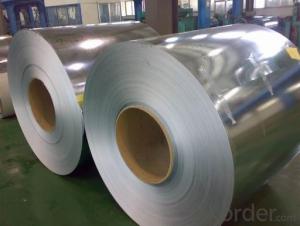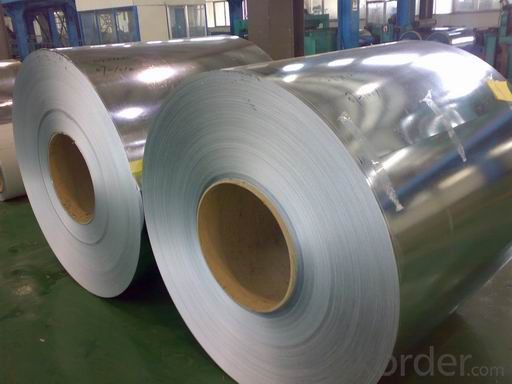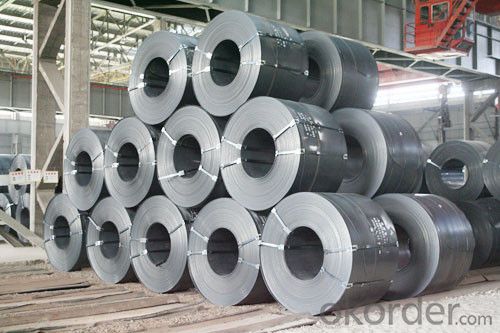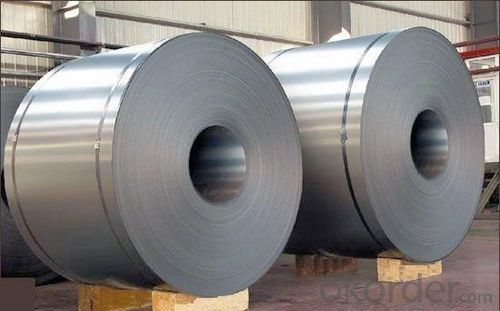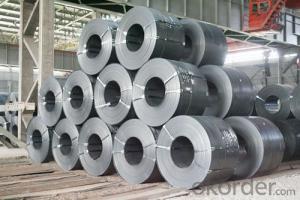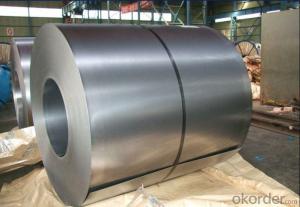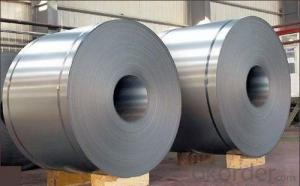Grade Q450NQR1 Corten Steel Coil 2.0*1250*C
- Loading Port:
- Shanghai
- Payment Terms:
- TT or LC
- Min Order Qty:
- 100 m.t
- Supply Capability:
- 20000 m.t/month
OKorder Service Pledge
OKorder Financial Service
You Might Also Like
Grade Q450NQR1 Corten Steel Coil 2.0*1250*C
Description:
-Grade: 09CuPCrNi-A
-Specification: 2.0*1250 in coil
Chemical Composition(%) of Grade Q450NQR1 Corten Steel Coil 2.0*1250*C:
| C | Si | Mn | P | S | Cu | Ti/V | Cr | Ni | RE |
| ≤0.12 | 0.25~0.75 | 0.20~0.50 | 0.060~0.12 | ≤0.020 | 0.25~0.50 | / | 0.30~1.25 | 0.12~0.65 | / |
Mechanical Properties of Grade Q450NQR1 Corten Steel Coil 2.0*1250*C:
| Thickness(mm) | Y.S(MPa) | T.S(MPa) | EL. A5% | Bend 180o | Impact Test | |
| oC | AKV J | |||||
| 2.0~≤6.0 | ≥345 | ≥480 | ≥24 | d=a | Normal/-40 | ≥47/≥21 |
| >6.0~12.0 | d=2a | |||||
Application of Grade Q450NQR1 Corten Steel Coil 2.0*1250*C:
Used in different weather. It has good anti rust protection and welding ability and is used in shipping container,support frame of outside building etc. Remarkably enhances the anti-corrosive performance of the structural element, lengthens the structural element service life, uses in manufacturing each kind of structural element which was used under the atmospheric envirenment and the caustic gas, the liquid envirenment.
Payment:
-Invoicing on theoretical weight or actual weight as customer’s request.
-FOB, CFR or CIF.
-Regular terms of payment:
1, 30% payment in advance, the remaining balance (70% payment) against the copy of B/L.
2, 30% payment in advance, the remaining balance (70% L/C) against the copy of B/L.
3, Negotiable.
-The payment terms will be written in contraction detailedly.
FAQ:
Q1: Why buy Materials & Equipment from OKorder.com?
A1: All products offered byOKorder.com are carefully selected from China's most reliable manufacturing enterprises. Through its ISO certifications, OKorder.com adheres to the highest standards and a commitment to supply chain safety and customer satisfaction.
Q2: How do we guarantee the quality of our products?
A2: We have established an advanced quality management system which conducts strict quality tests at every step, from raw materials to the final product. At the same time, we provide extensive follow-up service assurances as required.
Q3: How soon can we receive the product after purchase?
A3: Within three days of placing an order, we will arrange production. The shipping date is dependent upon the quatity, how many sizes you want and the plan of production, but is typically 1 month to 2 month days from the beginning of production.
Images of Grade Q450NQR1 Corten Steel Coil 2.0*1250*C:
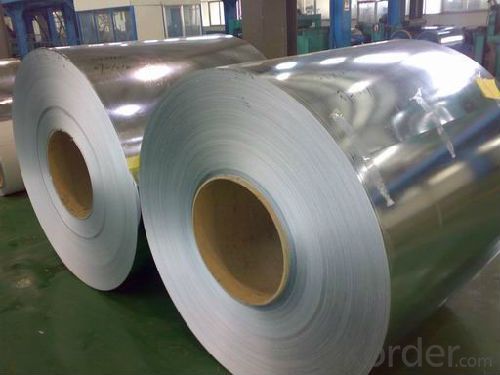
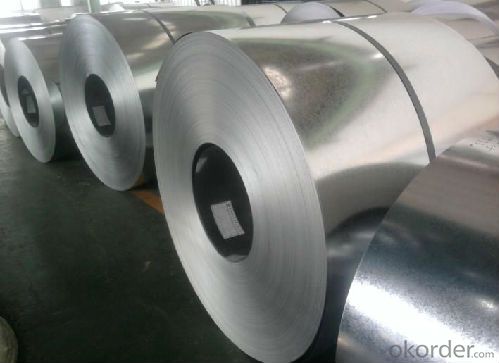
*If you would like to get our price, please inform us the size, standard/material and quantity. Thank you very much for your attention.
- Q: What are the main applications of special steel in the defense electronics?
- Special steel is used in defense electronics for a variety of applications. It is primarily utilized in the manufacturing of critical components such as casings, connectors, and circuit boards due to its exceptional strength, durability, and resistance to corrosion. Special steel's high magnetic permeability also makes it suitable for electromagnetic shielding, which is crucial in protecting electronic devices from external interference. Moreover, its heat resistance and ability to withstand extreme temperatures enable it to be used in electronic systems that operate in harsh environments. Overall, special steel plays a vital role in enhancing the reliability and performance of defense electronics.
- Q: How does the corrosion resistance of special steel compare to regular steel?
- Generally, special steel outperforms regular steel in terms of corrosion resistance. Special steel is specifically engineered to possess enhanced resistance against corrosion, thanks to its unique composition and manufacturing process. It often contains higher levels of alloying elements like chromium, nickel, and molybdenum. These elements create a protective layer on the steel's surface, preventing it from reacting with corrosive substances. In contrast, regular steel tends to have lower corrosion resistance due to its composition and lack of alloying elements. It is more susceptible to rusting and other forms of corrosion when exposed to moisture, atmospheric gases, or chemicals. Additionally, special steels can undergo additional treatments such as heat treatment, passivation, or coating. These treatments further elevate their corrosion resistance by forming a barrier against corrosive agents. As a result, the lifespan and durability of the steel are extended in corrosive environments. To summarize, special steel surpasses regular steel in terms of corrosion resistance due to its composition, alloying elements, and additional treatments. This quality makes it the preferred choice in applications where corrosion resistance is crucial, such as marine environments, chemical processing plants, or infrastructure exposed to harsh weather conditions.
- Q: What are the main factors affecting the tensile strength of special steel?
- The tensile strength of special steel is influenced by several factors. Firstly, the chemical composition of the steel plays a crucial role in determining its tensile strength. Elements such as carbon, manganese, silicon, and alloying elements like chromium, nickel, and molybdenum can significantly enhance the tensile strength of steel. These elements form solid solutions, carbides, and intermetallic compounds, which contribute to the material's ability to resist deformation under tensile loads. Secondly, the heat treatment processes applied to special steel have a profound impact on its tensile strength. Steel can be subjected to various heat treatment methods such as quenching and tempering, annealing, or precipitation hardening to achieve desired mechanical properties. These processes alter the microstructure of the steel, allowing for the formation of specific phases and grain structures that enhance its tensile strength. Additionally, the mechanical working or deformation processes that the steel undergoes can affect its tensile strength. Techniques such as rolling, forging, or extrusion can refine the grain structure and induce dislocations within the material, which can lead to an increase in tensile strength. The presence of impurities and defects within the steel can also impact its tensile strength. Inclusions, voids, or cracks can act as stress concentration points, reducing the material's overall strength. Therefore, proper quality control measures during the manufacturing process are essential to minimize these defects and ensure high tensile strength. Furthermore, the temperature at which the steel is exposed can affect its tensile strength. Special steel typically exhibits a decrease in tensile strength as temperature increases due to thermal expansion and the loss of material strength. Understanding the temperature range in which the steel will be used is crucial in selecting the appropriate grade with the desired tensile strength. In conclusion, the tensile strength of special steel is influenced by various factors including chemical composition, heat treatment, mechanical working, impurities, defects, and temperature. Considering these factors and optimizing them appropriately during the manufacturing process can result in special steel with exceptional tensile strength properties.
- Q: What are the different types of case-hardening steel?
- There are several different types of case-hardening steel, including carburizing steel, nitriding steel, and cyaniding steel.
- Q: How is spring steel used in the automotive industry?
- Spring steel is commonly used in the automotive industry for various purposes. It is primarily utilized to manufacture suspension systems, such as coil springs, leaf springs, and stabilizer bars. The unique properties of spring steel, including its high strength, elasticity, and resistance to deformation, allow these components to effectively absorb shocks and provide a smoother ride. Additionally, spring steel is also employed in the production of engine valves, seat frames, and steering components due to its durability and ability to withstand high temperatures and stress.
- Q: What are the requirements for special steel used in mining equipment?
- The requirements for special steel used in mining equipment are quite stringent due to the demanding nature of the mining industry. Here are some of the key requirements: 1. High strength and toughness: Mining equipment operates in extremely harsh conditions, where it is subjected to heavy loads, impacts, and abrasion. Special steel used in mining equipment must have high strength to withstand these forces and maintain its structural integrity. Additionally, it should possess excellent toughness to prevent fractures and withstand sudden shocks. 2. Corrosion resistance: Mining operations often take place in corrosive environments, such as underground mines or near bodies of water. Special steel used in mining equipment should exhibit high resistance to corrosion and oxidation to ensure its longevity and prevent premature failure. 3. Wear resistance: Mining equipment is exposed to abrasive materials, like rocks and minerals, which can cause significant wear. The special steel used in mining equipment should have excellent wear resistance properties to withstand continuous abrasion and prevent premature wear and tear. 4. Heat resistance: Mining equipment is frequently exposed to high temperatures due to the friction generated during operation or proximity to heat sources. Special steel used in mining equipment should have good heat resistance to maintain its mechanical properties and prevent deformation or structural failure. 5. Fatigue resistance: Mining equipment undergoes repetitive and cyclic loading, which can lead to fatigue failure over time. Special steel used in mining equipment should possess high fatigue resistance to avoid cracking or failure under these cyclic loading conditions. 6. Weldability and machinability: Special steel used in mining equipment should have good weldability and machinability to facilitate the fabrication and assembly processes. This ensures that the equipment can be easily manufactured, repaired, or modified as required. 7. Regulatory compliance: Mining equipment often needs to meet specific regulatory standards and certifications to ensure safety and environmental compliance. Special steel used in mining equipment should adhere to these regulations, ensuring that the equipment is safe to operate and does not pose any environmental hazards. In summary, the requirements for special steel used in mining equipment include high strength and toughness, corrosion resistance, wear resistance, heat resistance, fatigue resistance, weldability and machinability, and compliance with regulatory standards. These requirements ensure that the steel can withstand the harsh conditions and demanding operations encountered in the mining industry.
- Q: What are the different types of spring steel?
- There are several different types of spring steel, including high carbon spring steel, stainless steel, alloy steel, and piano wire.
- Q: How does special steel contribute to the shipbuilding industry?
- Special steel contributes to the shipbuilding industry in several ways. Firstly, special steel offers enhanced strength and durability, making it an ideal material for constructing various components of ships. This includes the hull, decks, bulkheads, and other structural elements that need to withstand the harsh marine environment and heavy loads. Special steel also provides excellent resistance to corrosion and abrasion, which is crucial for ships that are constantly exposed to saltwater and other corrosive agents. This ensures that the ship remains in good condition for a longer lifespan, reducing maintenance costs and increasing operational efficiency. Moreover, special steel offers superior weldability and formability, allowing shipbuilders to create complex shapes and structures with ease. This flexibility in design enables the construction of innovative and efficient ship designs, such as large container vessels, offshore oil rigs, and naval warships. In addition, special steel is often used for manufacturing critical components like propeller shafts, rudders, and engine parts. These components require high strength, toughness, and resistance to fatigue, as they are subjected to extreme forces and vibrations during operation. Special steel's unique properties ensure the reliability and performance of these crucial ship parts. Furthermore, special steel contributes to the shipbuilding industry by enabling the construction of lightweight ships without compromising strength and safety. This helps reduce fuel consumption, leading to improved energy efficiency and lower greenhouse gas emissions. As environmental regulations become increasingly stringent, special steel plays a vital role in making ships more sustainable and eco-friendly. Overall, special steel is an essential material in the shipbuilding industry due to its exceptional strength, durability, corrosion resistance, weldability, formability, and lightweight properties. Its use not only ensures the safety and longevity of ships but also facilitates the development of advanced ship designs and contributes to the industry's overall sustainability.
- Q: What are the main advantages of using special steel in the construction of bridges?
- The main advantages of using special steel in the construction of bridges are its exceptional strength and durability. Special steel alloys offer high tensile strength, allowing for lighter bridge designs and reducing the overall weight of the structure. This not only makes construction and transportation easier but also minimizes the environmental impact. Additionally, special steel exhibits excellent corrosion resistance, ensuring the longevity of the bridge even in harsh weather conditions. Its superior toughness and resistance to fatigue make it ideal for withstanding heavy loads and frequent use, ensuring the safety and reliability of the bridge for many years.
- Q: What are the different methods for improving the heat resistance of special steel?
- There are several methods for improving the heat resistance of special steel. These methods include: 1. Alloying: One of the most common methods is to alloy the steel with certain elements that enhance its heat resistance. For example, the addition of chromium, nickel, or molybdenum can significantly improve the steel's ability to withstand high temperatures. 2. Heat treatment: Heat treatment processes such as annealing, quenching, and tempering can be employed to enhance the heat resistance of special steel. These processes help in refining the microstructure of the steel and improving its mechanical properties, including heat resistance. 3. Surface modification: Applying specialized coatings or surface treatments can also improve the heat resistance of special steel. For instance, processes like nitriding, carburizing, or ceramic coating can create a protective layer on the surface of the steel, preventing oxidation and improving its ability to withstand high temperatures. 4. Grain refinement: Controlling the grain size of the steel through processes like grain refinement or recrystallization can enhance its heat resistance. Smaller grain sizes reduce the diffusion of atoms within the material, making it more resistant to high temperatures. 5. Precipitation hardening: Precipitation hardening is a technique where small particles are formed within the steel matrix, strengthening the material and improving its resistance to heat. This method involves a specific heat treatment process that enables the formation of these particles. 6. Controlled cooling: Optimizing the cooling process after heat treatment can also improve the heat resistance of special steel. By controlling the cooling rate, the formation of undesirable phases or microstructural defects can be minimized, ensuring better heat resistance. 7. Material selection: Choosing the right type of special steel with inherently high heat resistance properties is another method for improving heat resistance. For example, stainless steel, tool steel, or superalloys are known for their excellent heat resistance and are often selected for applications where high temperatures are involved. It is worth noting that the selection of the appropriate method or combination of methods for improving heat resistance depends on the specific requirements and constraints of the application.
Send your message to us
Grade Q450NQR1 Corten Steel Coil 2.0*1250*C
- Loading Port:
- Shanghai
- Payment Terms:
- TT or LC
- Min Order Qty:
- 100 m.t
- Supply Capability:
- 20000 m.t/month
OKorder Service Pledge
OKorder Financial Service
Similar products
Hot products
Hot Searches
Related keywords
